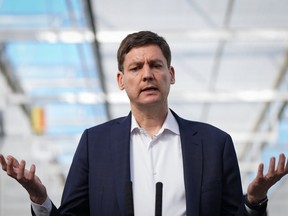HONG KONG — When a team of producers at Radio Television Hong Kong (RTHK) heard on May 19 that the publicly funded broadcaster planned to axe one of its most popular weekly shows, they rushed to the building next door to confront the station’s head.
A group of about 20 producers and other employees from RTHK’s TV and radio operations barged into a conference room where Leung Ka-wing, director of broadcasting, was meeting with top executives.
Some staff demanded to know why the satirical and current affairs television show “Headliner” – which had drawn official complaints after poking fun at the Hong Kong police in an episode in February – was being canceled, and whether the move was prompted by pressure from authorities.
The impromptu meeting lasted about 90 minutes, during which several staffers cried and raised their voices, according to three people present. Leung said he took the decision to cancel the show in order to “protect RTHK” and its staff, according to the three people.
As conversations continued inside the conference room, RTHK announced it was suspending production of the Chinese-language show, which had been running since 1989, at the end of the current season. RTHK apologized to anyone offended by the station’s output but did not give a reason for the suspension.
Leung, 67, who made his name in broadcasting during the Tiananmen Square crackdown on pro-democracy protesters in Beijing in 1989, declined to answer Reuters’ questions about the meeting. He denied making the comment about protecting RTHK, according to RTHK spokeswoman Amen Ng. Other executives in the meeting that Reuters could identify did not reply to requests for comment.
Hong Kong’s government did not comment on whether it had pressured Leung to cancel the show.
RTHK, founded in 1928 and sometimes compared to the British Broadcasting Corporation, is the only independent, publicly funded media outlet on Chinese soil. It is guaranteed editorial independence by its charter.
The cancellation of “Headliner” has prompted fear among some journalists that mounting pressure from the Hong Kong government and Beijing will destroy that independence.
Hong Kong reached boiling point last summer as millions of pro-democracy protesters took to the streets and some of them clashed violently with police, posing one of the biggest challenges to China’s leader Xi Jinping since he came to power in 2012.
In response to the protests, China said last month it would introduce national security legislation in Hong Kong to prohibit secession, subversion and external interference. More than a dozen people working at RTHK and other media organizations told Reuters they fear that legislation could be used to silence or shut down independent media in the territory.
The situation is like being under the blade of a guillotine, said Jimmy Lai, the publisher of Hong Kong’s pro-democracy Apple Daily newspaper, which like RTHK, has for years drawn the ire of Hong Kong’s government and Beijing: “There’s no half-way. It’s falling.”
Lai, 72, has been repeatedly denounced by state-run Beijing media and pro-China media in Hong Kong, painting him as the local face of what they describe as a U.S. interference campaign. He has been arrested twice this year on charges of illegal assembly related to protests last year.
Lai and some other members of the media fear the new legislation – which has not yet been set out in detail – will make Hong Kong more like mainland China, where the ruling Communist Party runs or controls the vast majority of media and routinely censors dissenting views. The country imprisoned at least 48 journalists last year, more than any other country, according to the Committee to Protect Journalists.
Hong Kong’s leader Carrie Lam has denied the new legislation would curtail media freedom, saying last month that “freedom of expression, freedom of protest, freedom of journalism, will stay.” Hong Kong is guaranteed freedom of speech and the press under Article 27 of the Basic Law, the mini-constitution agreed by China when it took back control of former British colony in 1997.
A spokesperson for China’s Ministry of Foreign Affairs told Reuters the proposed legislation “only targets activities related to subversion, separatism, terrorism and foreign interference into Hong Kong affairs,” and that it will “not affect freedom of speech, media freedoms, or any other rights and freedoms.”
China’s Liaison Office in Hong Kong, Beijing’s official base in the city, did not reply to requests for comment on whether China sought to control or suppress RTHK or if the new national security legislation would curtail media freedom in Hong Kong.
UNDER THE MICROSCOPE
Scrutiny of RTHK has increased dramatically since late February, when a two-minute segment on “Headliner” entitled ‘Police Farce Report’ showed an actor dressed as a Hong Kong police officer standing inside a large rubbish container with his hands covered in plastic.
The skit shows police in various situations wearing biohazard suits and masks, satirizing how well equipped police officers are compared to medical workers. The actor, Kwong Ngai-yee, told Reuters the idea was based on the “Sesame Street” puppet Oscar the Grouch and that he hoped to “ease public anger through humor.”
Hong Kong police were not amused. The force’s commissioner Chris Tang complained to Leung in writing in early March, saying the show “smeared the police and their work during the coronavirus period.” RTHK had “reversed right and wrong, and we simply can’t accept it,” Tang wrote in the letter, which was made public by RTHK.
On the morning of May 19, Hong Kong’s Communications Authority, which regulates the city’s broadcast and telecoms sectors, published a report criticizing the broadcaster, saying the segment “smeared the police by suggesting that the police were trash, worthless and revulsive.”
As the RTHK employees met with Leung that evening, Hong Kong’s Commerce and Economic Development Bureau, which oversees RTHK, released a statement on its website demanding that the broadcaster examine its production and editorial processes and “follow up or take disciplinary actions” on any staff found to have committed “negligence or errors.”
Nine days later, the Commerce Bureau announced an unprecedented, government-led review of RTHK’s governance and management – spanning its administration, financial control and manpower – to ensure it complies with its charter. The review is expected to be concluded by the end of the year.
A spokesman for the Commerce Bureau told Reuters in an email that RTHK has editorial independence, but as a government department, RTHK and its staff “are subject to all applicable government rules and regulations.”
“Ultimately RTHK is part of the government, and in theory it could do anything to us,” said Gladys Chiu, the chairperson of RTHK’s program staff union, which represents about 400 of the station’s 700 staff. The new legislation and increased scrutiny of RTHK could be used “to coerce the staff into broadcasting or reporting in a way that is approved by the government,” she said.
RTHK also faces pressures at street level. Small groups of pro-Beijing protesters regularly gather outside its headquarters in Kowloon, waving Chinese flags and signs accusing the broadcaster of anti-government bias.
“Shut it down,” the crowds chanted continuously during one protest in January, according to video news coverage, while calling RTHK a “cockroach” station, a description some police have used to describe pro-democracy protesters.
Some RTHK staff have been threatened in social media posts and targeted in the pro-Beijing media in Hong Kong for perceived anti-government bias. Some pro-Beijing lawmakers also routinely attack RTHK. One outspoken critic, Junius Ho, last month demanded the broadcaster become a “government mouthpiece.”
“It’s very worrying because we see RTHK being reined in by every means,” said Shirley Yam, vice chairperson of the Hong Kong Journalists Association.
RISING TENSION
China and the United States have been engaged in a tit-for-tat spat over the presence of the other’s journalists for several months.
The United States slashed the number of journalists permitted to work at Chinese state-owned media outlets in the country to 100 from 160, citing a deepening crackdown on independent reporting inside China. In March, Beijing revoked the media credentials of about a dozen American reporters working in mainland China for the Wall Street Journal, Washington Post and New York Times, saying the reporters would not be allowed to relocate and work in Hong Kong.
U.S. Secretary of State Mike Pompeo said in a statement on the State Department’s website last month that the Chinese government “has threatened to interfere with the work of American journalists in Hong Kong,” without giving details.
A source with direct knowledge of the matter told Reuters that if the row with the United States escalates further, Beijing could intervene in the issuance of work visas for foreign journalists in Hong Kong.
The spokesperson for China’s Ministry of Foreign Affairs said: “Visa issues are a matter of national sovereignty. The Chinese government manages affairs related to foreign media and foreign journalists according to laws and regulations.”
Intervening in the issuance of journalists’ visas would be a highly contentious move for Hong Kong, which although part of China, operates with a high degree of autonomy. In 2018, the visa of the Financial Times’ Asia editor, Victor Mallet, was not renewed by Hong Kong after he moderated a speech by a pro-independence activist at an event hosted by the Foreign Correspondents’ Club (FCC) in the city. The move alarmed some diplomats and business groups in Hong Kong.
The event angered China, and a senior official said at the time that the FCC had broken the law by hosting a “separatist.” Hong Kong authorities never publicly explained why Mallet’s visa had not been renewed, saying they could not comment on individual cases.
Hong Kong’s global media freedom ranking is in free-fall. Reporters without Borders (RSF) said Hong Kong fell to 80th place in 2020 in its global press freedom index, down from 18th in 2002. Over the past year, reporters covering protests in the city have been detained, pepper-sprayed and shot with rubber bullets and tear gas canisters by police.
“A security law dictated by China would give a massive blow to press freedom in Hong Kong,” said Cédric Alviani, the head of RSF’s East Asia bureau. “(It would) allow the regime to engage in the type of intimidation that we see on their side of the border.” (Reporting by James Pomfret and Greg Torode in Hong Kong Additional reporting by Beijing newsroom Editing by Bill Rigby)





















